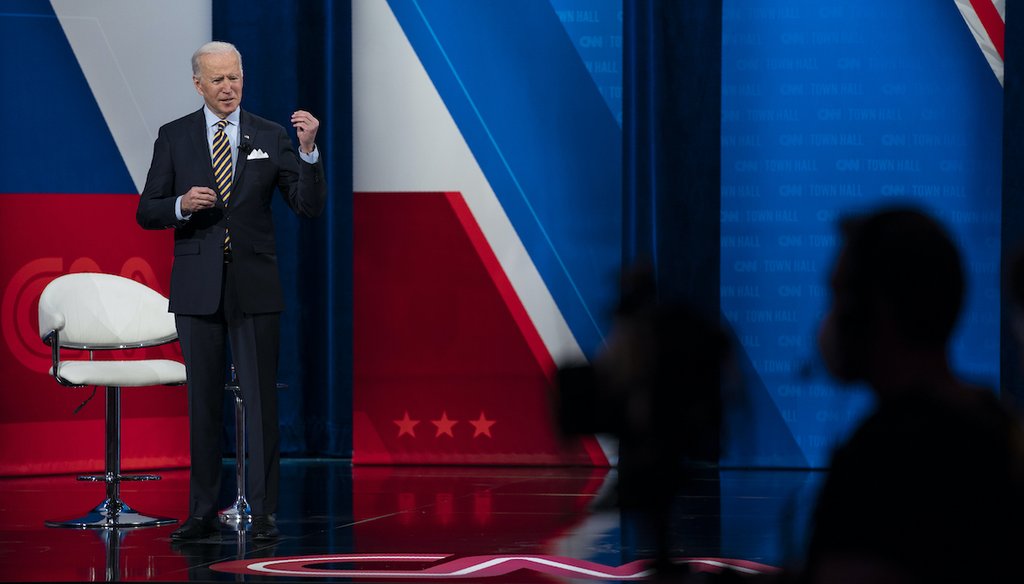Stand up for the facts!
Our only agenda is to publish the truth so you can be an informed participant in democracy.
We need your help.
I would like to contribute

President Joe Biden participates in a televised town hall event Feb. 16, 2021, in Milwaukee. (AP)
If Your Time is short
- A Joe Biden comment at a town hall about Beijing’s repression of Uyghur Muslims struck some of his critics as too deferential to the Chinese regime.
- During the town hall, Biden was clearer in accusing China of violating the Uyghurs’ human rights, and warning that the U.S. would respond.
Critics of President Joe Biden have long tried to paint him as soft on China. And they were quick to seize on a comment he made about Beijing’s repression of Uyghur Muslims as evidence for their case.
In a CNN town hall Feb. 16, host Anderson Cooper asked Biden whether he had spoken to Chinese President Xi Jinping about Uyghurs. As part of his answer, Biden said, "Culturally, there are different norms that each country and their leaders are expected to follow."
U.S. officials on both sides of the political divide generally haven’t minced words about China’s treatment of the Uyghurs. On his last day as President Donald Trump’s secretary of state, Mike Pompeo labeled the situation a "genocide" and a "crime against humanity." Biden’s own secretary of state, Tony Blinken, also used the term "genocide" in his confirmation hearing to describe the Uyghurs’ treatment.
So Biden’s comment about cultural norms struck some critics as too deferential to the Chinese regime.
The New York Post reported that Biden was "dismissing" the genocide of Uyghurs by using that phrase. In a speech to Republican lawmakers, former National Security Adviser H.R. McMaster accused Biden of "bigotry masquerading as cultural sensitivity." On Fox Business, Pompeo said that Biden is "echoing Chinese propaganda."
Sign up for PolitiFact texts
Those reactions downplayed other points in the town hall when Biden was clearer in accusing China of violating the Uyghurs’ human rights, warning that the U.S. would respond.
Given the widespread attention directed at Biden’s sentence about cultural norms, we thought it would be instructive to look at them in the context of his full remarks at the town hall about China and Uyghurs.
First, Biden answered a question about a recent phone call with Xi and whether he had spoken to him about the Uyghur genocide:
Cooper: "What about the Uyghurs? What about human rights abuses in China?"
Biden: "We must speak up for human rights. It's who we are. We can't — my comment to him was — and I know him well, and he knows me well. We're — a two-hour conversation.
Cooper: "You talked about this to him?"
Biden: "I talked about this, too."
Then, Biden implied he will not remain silent with Xi on contentious human-rights and strategic issues.
Biden: "If you know anything about Chinese history, it has always been the time when China has been victimized by the outer world is when they haven't been unified at home ... to vastly overstate it. The central principle of Xi Jinping is that there must be a united, tightly controlled China. And he uses his rationale for the things he does based on that. I point out to him, no American president can be sustained as a president if he doesn't reflect the values of the United States. And so the idea I'm not going to speak out against what he's doing in Hong Kong, what he's doing with the Uyghurs in western mountains of China, and Taiwan, trying to end the One China policy by making it forceful, I said — by the way, he said he gets it. Culturally, there are different norms that each country and their leaders are expected to follow."
Biden’s comment on cultural norms appeared to be an acknowledgment that both leaders would have to uphold their respective country’s values. For the U.S., that would mean speaking out about human rights.
A spokesperson for the White House’s National Security Council said that’s what Biden was trying to convey. "The President was speaking about the need for U.S. presidents to speak out on universal values, which are deeply held by Americans, and about human dignity everywhere," spokesperson Kedenard Raymond told PolitiFact.
In the town hall, Biden also said China would face repercussions, without offering specifics.
Cooper: "When you talk to him, though, about human rights abuses, is that as far as it goes in terms of the U.S.? Or is there any actual repercussions for China?"
Biden: "Well, there will be repercussions for China. And he knows that. What I'm doing is making clear that we, in fact, are going to continue to reassert our role as spokespersons for human rights at the U.N. and other agencies that have an impact on their attitude."
Our Sources
New York Times, "U.S. Says China’s Repression of Uighurs is Genocide," Jan. 19, 2021
New York Post, "Biden dismisses Uighur genocide as part of China’s different norms," Feb. 17, 2021
Washington Post, "H.R. McMaster accuses Biden of bigotry over China comments," Feb. 19, 2021
Fox Business, "Pompeo says Biden echoing Chinese propaganda on Uighur persecution," Feb. 17, 2021
CNN, "CNN Presidential Town Hall With Joe Biden," Feb. 16, 2021
Email, Director of Communications at the National Security Council Kedenard Raymond, March 4, 2021



















